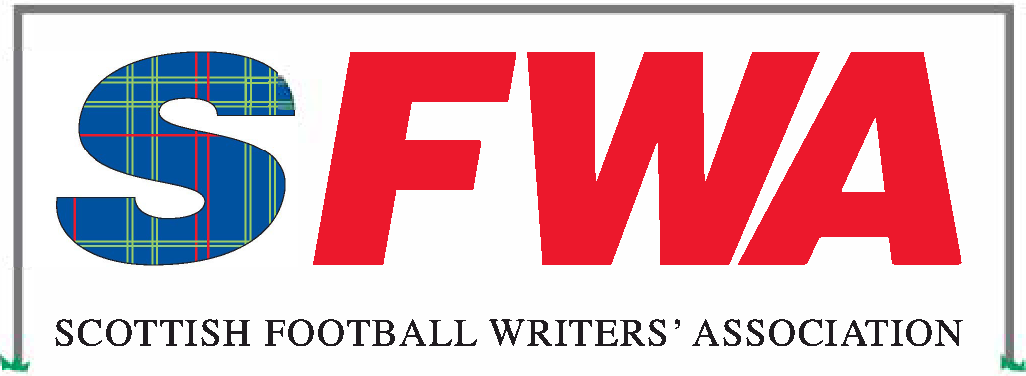IN August, 2012 the only two surviving founder members of the Scottish Football Writers’ Association – Allan Herron and Martin Frizell, sat down with the then President, Roddy Forsyth, in the convivial setting of Sarti’s café restaurant in Glasgow’s Wellington Street. The coffee cups were refilled several times as the tale of the SFWA’s early years and characters unfolded. This is an account of the conversation.
RF: What prompted the formation of the Association?
MF: I have recollections that the start of the SFWA originated in a Scotland tour in the summer of 1957 when the last of three games was against Spain in Madrid. George Young (right) – who was a highly popular captain of Scotland and Rangers – had told journalists that he would be retiring from international football after that game. However, there was a clique amongst the SFA’s Selection Committee who were very much of an anti-Young mind and the upshot was the shock announcement by the selectors that Young would not be playing and would therefore be deprived of his farewell appearance. The spurious excuse was that he had no right to jump the gun and presume that he would be picked.
AH: That’s right. There was no team manager at that time and when the selectors decided that they would drop the legendary Rangers skipper for the game against Spain in Madrid, which was a World Cup qualifying tie, it not only created a bitter chasm of hostility between the SFA officials and the football writers covering the match, it also subsequently led to the formation of our Association. You see, with 53 Scotland caps, including 48 as captain, Young was popular with the Press.
On what was a close-season three-match tour, which included two World Cup qualifiers, he had led the Scots to a 2-1 win over Switzerland in Basle but had to pull out of a friendly against West Germany in Stuttgart three days later because of a muscle strain. He was replaced at centre half by Celtic’s Bobby Evans, who played well in a 3-1 win. Then, in the build-up to the vital tie in Madrid three days later, Young declared that this would be his last game for Scotland.
That did not go down well with the brigade of selectors who had yet to pick the team. Their attitude was: “What player has the right to say when he would play for Scotland?” So, the contentious decision was made that Evans would keep his place and that Tommy Docherty would be captain against the Spanish. Young was out and Spain outclassed Scotland to win 4-1.
MF: Natural sympathy in the Press was on Young’s side. However, a mole in the camp - or maybe somebody back home - was feeding the SFA with details of the coverage and there was intense bad feeling. Some of the journalists felt that they were being picked on and it was decided that we should form a Football Writers’ Association to protect our interests.
AH: The gentlemen of the SFA hierarchy, perhaps not surprisingly, took considerable stick in column inches. Young got the full sympathy of the Press. It was during this deteriorating relationship between the officials and the writers that Jimmy Stevenson – who became our first President – suggested that the time had come to form the SFWA, to create a better understanding with the SFA, the Scottish Football League and the clubs in Scotland. A date was immediately set for a meeting of all football writers to meet in His Lordship’s Larder (below) in St Enoch’s Square a favourite watering hole for the Press, managers and referees.
Glasgow's St Enoch Square in the 1950s
MF: Jimmy Stevenson was the live wire and thus, in September 1957, a meeting of 20 or so writers formed the Association in His Lordship’s Larder – sadly, now long gone. Allan – who was then with the Evening Citizen – and myself, with the Daily Herald, later to be rebranded as the Sun, are the only survivors. One of our early campaigns was to achieve proper after-match interview facilities. In those days, the only way to speak to managers and others at the big clubs was to wait outside the front door until the great and the good emerged. Gradually we began to get a foot inside the door.
Celtic introduced a system where you wrote a letter asking to be allowed inside for interviews. This got you into the lobby and then into the manager’s pokey wee office beside it. For after-match interviews at Scotland games the SFA at first gave the dailies or the Sundays a grand total of three passes. You didn’t know if you were getting one until you got the envelope with your normal tickets.
AH: You had to agree to do the interviews for all the papers, even the ones you didn’t work for. It wasn’t a good or popular way of doing things.
Allan Herron's SFWA membership card from 1957
MF – Later, when we got a proper room for everyone beside the entrance at Hampden Park, these three passes were still used, so that the holders could go into the lobby to speak to those players not usually brought into the Press conference. Rangers allowed us inside the front door – no further than the radiator – then we got upstairs to the Trophy Room and later we got the excellent facilities I remember.
AH – Mind you, the radiator had its advantages!
MF – Aye – a lot of us preferred the radiator limit. What the Ibrox hierarchy hadn’t realised was that, because the dressing room doors were at each side of the hallway, we had access to the players emerging – and we could also nab VIPs coming down the marble staircase. Other clubs were more generous but when FIFA and UEFA demanded proper press facilities for their games our battle was won.




